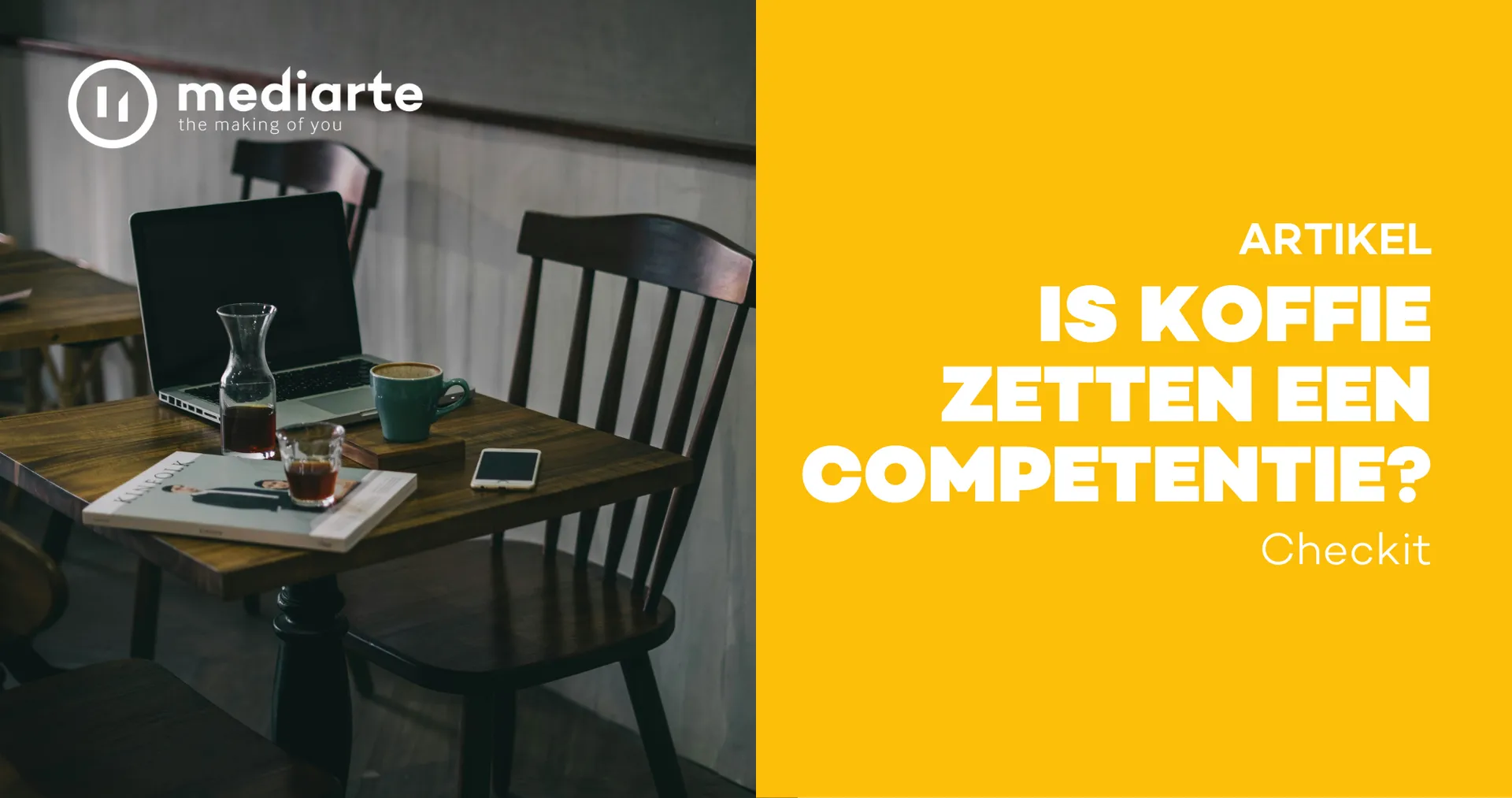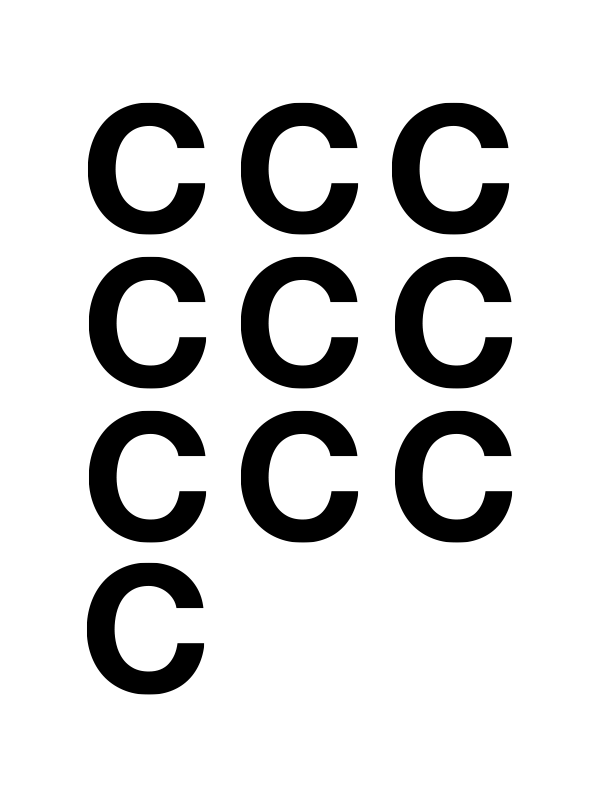Making Coffee as a Calling Card? Checkit Explores
5 min read

In this article by Geert Genbrugge of mediarte, discover how organisations like mediarte and CYANOTYPES are forging a new path in the audiovisual sector, where competency development is integral to the future-proofing of businesses.
Is the art of brewing delicious, flavorful, aromatic coffee a competence? This question recently sparked an animated conversation over a cup of coffee, delving into what coffee triggers in people. The consensus? Quite a lot. Coffee, it turns out, is about people craving, desiring, needing, and relying on it to function. Coffee motivates us. It’s the reason many of us get up in the morning. It fosters connections, love, and comfort, bringing people together.
Some filmmakers attribute the start of their careers to delivering coffee on film sets—a coffee for the director, the camera operator, the first assistant director. Their initial roles involved keeping the crew and actors content to ensure smooth sailing through grueling shooting days. Offering coffee at the right moment was crucial, symbolising a connection and recognition of someone’s need, making them feel seen and understood—a significant gesture. Observing and learning, befriending everyone, coffee served as their calling card.
On 9 May 2023, with soft drum rolls and solemn speeches, the European Year of Skills (EYS), commenced. Likely, there was also coffee served afterwards. Until 8 May 2024, thousands of events related to skills development are being organised across Europe. The tumultuous climate change, the unpredictable advancement of artificial intelligence, the rapid digital, technological, and green transition, and global conflict zones are the driving forces behind these initiatives. The English terms skilling, upskilling, reskilling, skill gaps, skillsets, soft skills, and future skills, along with triple loop learning, unlearning, and relearning, must have become familiar by now and should resonate with you. The future competitiveness of Europe hinges on embracing these concepts, with the notion that those who learn faster are more likely to survive and thrive.
Mediarte is eager to respond swiftly and has previously developed the competency scan, an online tool for identifying necessary skills for specific jobs. After completing a scan, this tool suggests tailored training and job opportunities based on the user’s skills, making retraining and further education more accessible. It requires effort; there’s no guarantee of employment. However, it presents an opportunity, offers possibilities, and extends an invitation.
Additionally, interns are encouraged during their media internship to identify and document the competencies they acquire in their logbooks and later include them in their resumes. This ensures that the skills they have developed can be endorsed by their internship mentors and aligns with the trend towards recognising micro-credentials for targeted training.
The terms “competencies” and “skills” have been mentioned several times and are used interchangeably. This rarely causes issues. However, a distinction is made. Competencies are considered to encompass knowledge, attitude (behavior), and skills (abilities). Sometimes, values are also included. For now, we’ll stick with the first three. Thus, skills are a part of competencies. To acquire a competency, you need knowledge of the task at hand, behavioral characteristics that enable you to apply your knowledge and skills, and of course, the skills inherent to a task or role. Developing a conceptual framework is one of the keys to acquiring a wide range of competencies. What can be named, can be discussed. But wait. There’s more.
In 2017, Europe introduced the multilingual ESCO classification (European Skills, Compentences, Qualifications and Occupations) to develop a common language around skills, competences, qualifications, and occupations across Europe. 13.890 skills are linked to 3.008 occupations, translated into 28 languages. This, however, reveals significant differences in approach and that linguistic confusion undermines unity. It’s a complex issue. Yet, embracing complexity is seen as an important skill, one that we are keen to master.
To keep abreast of developments, mediarte joined Pact for Skills and Creative Skills Europe, two platforms where employers’ organisations, training providers, unions, and stakeholders from the audiovisual and live performance sectors collaborate to refresh, enhance, and broaden the accessibility of current training opportunities for job seekers and professionals. Together, they create a hub and a learning network. In November 2023, mediarte also participated in the Creative Skills Week in Vienna, where Viennese coffee houses—recognised by UNESCO as intangible cultural heritage since 2011—are an institution. As are the baristas behind the elegant art-deco counters and the waiters with their expert knowledge of coffee brewing, as well as pastries and cakes.
In addition, mediarte is a key partner of CYANOTYPES, a pan-European project funded by the European Community and initiated by a consortium of 20 members, led by HKU University of the Arts Utrecht. Along with several leading European organisations from the cultural and creative sector—such as the European Network for Higher Arts Education (ELIA), Universidade Lusófona, the European Creative Business Network (ECBN), Yrkesnämnden för Film och TV (YNFT), the European Creative Hubs Network (ECHN), and innovative and experienced training program developers like MateraHub, WIFI-WKO, MyData, and EQ Arts—mediarte contributes to this valuable, inspiring, and highly educational journey.
The partners in CYANOTYPES tirelessly and collaboratively work on a methodology to map the competencies present, lacking, or emerging within the Cultural and Creative Industries (CCI). It’s a far-reaching and enriching research project populated by out-of-the-box thinkers committed to linking their organisations’ internal networks with external information sources. In short: boundary spanners. Regular reality checks keep everyone grounded. Within three years, a tangible outcome is expected—a model for mapping competencies. The journey towards it is already worthwhile.
On this journey, signs of neoliberalism are also encountered. Our language has become infused with the discourse on competencies. George Monbiot, a critical investigative journalist, describes in his book “Out of the Wreckage: A New Politics for an Age of Crisis,” the nuanced role and influence of neoliberalism on our thinking: “The persistent whisper if you’re unemployed isn’t due to structural unemployment but rather your lack of effort and enterprise” (2017; p. 39).
Listing competencies should not serve to frame someone negatively. It’s crucial to ensure that the frameworks of a competency matrix do not become the bars of a prison trapping someone. It’s easy to find a stick to beat someone with. Let’s be mindful of that. A thoughtless analysis reveals more about the one undervaluing others than about the targeted individual’s qualities. Employers are expected to draw meaningful conclusions from an independent and expert evaluation—a competency in itself. Listing competencies becomes meaningful when it focuses on existing strengths and areas for growth. Recognising and developing a talent begins with noticing, recognising, or discovering it.
The late VUB honorary rector, Caroline Pauwels, in her book “Ronduit: Overpeinzingen van een possibilist,” outlines three criteria for a compelling European narrative: “It must be future-oriented, inspire dreaming, and make a difference in people’s daily lives” (2021; p. 202). I wholeheartedly agree and advocate for recognising competencies like daydreaming, wandering, browsing, lingering, strolling, slowing down, eating pastries, and laying in the grass watching clouds—ideal breeding grounds for inspiration. The strict discipline we impose on ourselves to meet tight deadlines in packed schedules demands an equally significant freedom to relax the reins when we choose.
Psychotherapist and international executive coach Jan Ardui, in his recent book “A Pathway to Humble Authority,” highlights the distinctive feature of brilliant people: extreme discipline paired with immense inner freedom. “This combination of discipline and freedom engenders a way of exercising authority that is flexible, a capacity to focus that is open, and a quality of authenticity that is extremely influential” (2023; pp. 8-9). He points to the interplay of complementarities leading to impactful and notable outcomes. The challenge and art lie in maintaining a balance between staying true to oneself and meeting organisational requirements.
These diverse paths bring me back to our own audiovisual sector. Creative Skills Europe and CYANOTYPES serve as invaluable resources and forums for idea exchange, aiding in the constructive development of the Checkit guidance programme. This initiative, in close collaboration with three other social funds—Liberform (liberal professions), 323-fonds (real estate sector), and Podiumkunsten (performing arts)—offers free guidance for SMEs to navigate existing competencies and potential training opportunities, aiming to future-proof the business. Details are available on mediarte’s website. A barista training could be one of the possibilities, which could serve as an excellent team-building activity.
So, when I come by soon to introduce Checkit and evaluate your organisation together, you’ll already have an idea of the perfect way to welcome me.
This article is written by Geert Genbrugge and published on www.mediarte.be.
Related content
Organising Learning in Regenerative Systems: The triple loop is the message
This essay introduces CYANOTYPES, a collaborative multi-year research project that set out to explore and address how people across the creative sector — arts, culture, and design in all their manifestations — might organise learning in the (immediate) future, and outlines a creative agency model to facilitate the development of curricula and custom learning journeys, contending that especially in the context of the growing role of intelligent systems in the creative process, a focus on creative agency makes sense to frame the analysis as well as the design of learning processes.
By Soenke Zehle, Sónia Alves, David Crombie, and Esko Reinikainen
